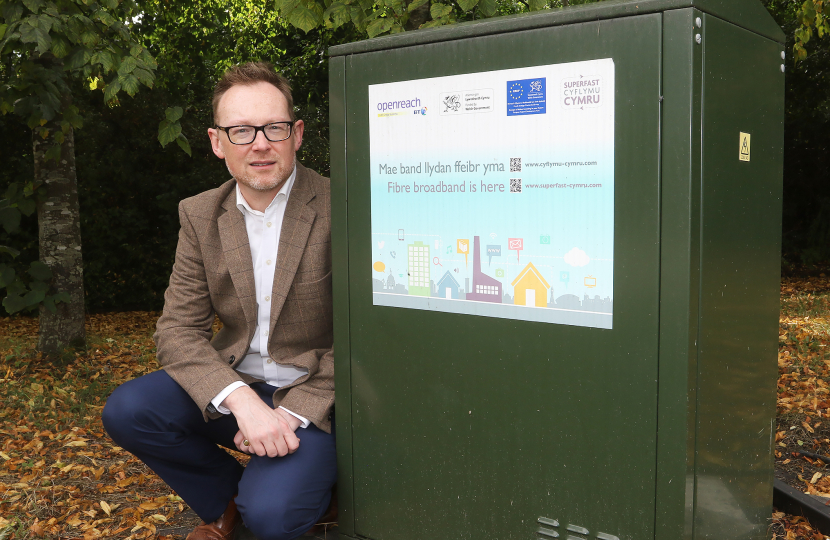
Better Broadband & Mobile
Updated January 2025
Broadband
Significant progress is being made in expanding broadband coverage across Powys, but many homes still struggle with poor connectivity. In Montgomeryshire, over 89% of premises can access superfast broadband (over 30 Mbps), and 61% have gigabit-capable speeds (over 1000 Mbps). However, these figures remain below the national averages of 98% and 81%, respectively.
The UK Government’s Project Gigabit, a £5 billion initiative to deliver gigabit-capable broadband to the hardest-to-reach areas is progressing across Montgomeryshire. I worked closely with former MP Craig Williams to help promote several locally targeted schemes.
Rollouts in areas like Kerry, Llanbrynmair, and Tregynon have been successful, with Llanbrynmair achieving 100% Ultrafast Full Fibre coverage to all homes on the Llanbrynmair exchange, which was the first area in the UK to do so. Similar projects in Berriew have reached 100% of the pledge target, with Openreach upgrading the network to cover 470 premises during 2024. As at December (2024), 94% of homes in the Tregynon exchange area had access to full fibre coverage. In Llanrhaeadr, the build is ongoing and in December 50% full fibre coverage had been reached. Thousands of properties in Mid Wales have been connected during 2024.
Through Building Digital UK, (BDUK) which is an organisation set up by the previous UK Government, contracts are being awarded to bring gigabit-capable broadband to other areas not covered by commercial plans. The partnership between BDUK, local councils, and Openreach ensures infrastructure work, like trench digging and fibre installation, progresses efficiently. Many more premises are set to benefit this year (2025). Once the network is in place, residents and businesses will be able to upgrade to these improved services through their providers.
I continue to regularly meet with industry representatives, including Ofcom and Openreach, to advocate for improved broadband services.
Mobile
I have been supporting plans for 16 new mobile masts across Montgomeryshire. These masts are the new 4G critical communications system for Britain’s emergency services. There are several masts already operational, and I provide details below. I will be meeting with BDUK during January (2025) to discuss the progress on the masts not yet online.
Key infrastructure is also being delivered by EE through upgrades to its existing network, and the Home Office is supplementing this by building masts to give the emergency services 4G mobile network coverage in some of the most rural and remote parts of Britain. This will mean significantly improved mobile connectivity for us in Mid Wales.
I also regularly speak with mobile providers to emphasise the importance of providing commercial service through these masts.
Updates on the masts below:
• Y Fan, Llanidloes - This mast has been activated and delivering new coverage since March 2024.
• Llanidloes - This mast has been activated and delivering new coverage since March 2024.
• Llangynog - This mast has now been activated and all four major providers are online.
• Staylittle - This mast has been descoped from the original programme. However, the mast will still have EE commercial coverage as part of EE’s agreement with the Home Office. I am waiting to hear back from the Home Office on the provision of activation for EE use.
• Llanrhaeadr Ym Mochnant - This mast has been activated and delivering new coverage since March 2024.
• Hafren Forest, Llanidloes - This mast was approved in October. The build has been upgraded ann will be passed onto the next stage in March 2025. The site will begin the activation programme and it is hoped that this will be online by 2026.
• Manafon, Welshpool - This mast is at the first stage of design and planning. The site will also be part of the Shared Rural Network. This site will be handed over to the major mobile coverage providers who will look to activate in early 2026.
• Rhiwargor - This mast has been activated and delivering new coverage since May 2024.
• Lake Vyrnwy, Llanwddyn - This mast has been descoped due to cost viability.
• Tyn-y-ffynon, Lake Vyrnwy - This mast is in the design and upgrading phase and is hoped to be handed over to the major network providers in June 2025.
• Maengwynedd, Oswestry - This mast has been activated and delivering new coverage since November 2024.
• Llanfyllin - This mast has been activated and delivering new coverage since October 2024.
• Tregynon - This mast has been activated and delivering new coverage since June 2024.
• Bettws Cedewain - This mast has been built, upgraded and will be handed over to the major network providers in March 2025. The network providers will then have 12 months to activate.
• Aberhosan, Machynlleth - Waiting for the lease to be completed so there's Shared Network rights on the site.
• Hirnant, Abertridwr - This mast is on the reserve site list.
